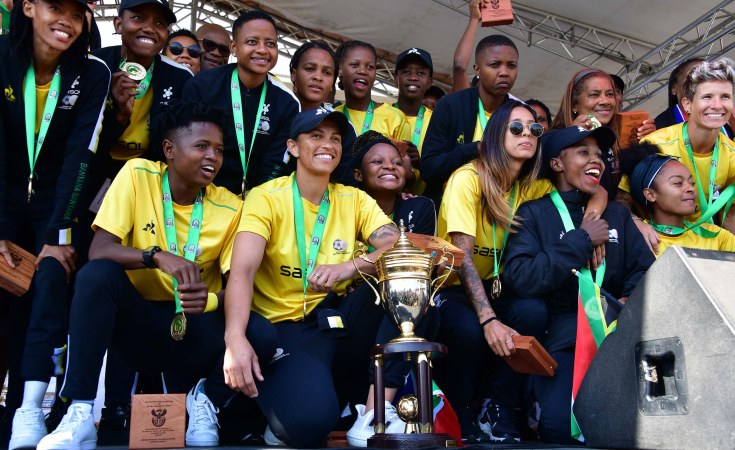Four African teams are competing in the Women's World Cup -- but their enthusiasm is eroded by poor labor conditions, unfair payments and sexual abuse. DW looks at what Africa's women footballers have been enduring.
The Women's World Cup kicks off on Friday with four African teams taking part: South Africa, Morocco, Zambia, and Nigeria.
That should be reason to be excited -- but in the months leading up to the Women's World Cup, there's been one scandal after another.
Boycotts have taken place because of missing contracts, low pay and poor pitches. And Zambia's coach has been accused of sexual misconduct.
Low payments
Two weeks before the opening match, the South Africa Women's World Cup team boycotted a warm-up because of the lack of bonuses offered by the South African Football Association (SAFA) and no written agreements about World Cup payments.
The Nigerian women's football team experienced a similar issue. The Nigerian Football Federation is witholding match bonuses for its Women's World Cup players who refused to train because of outstanding wage payments.
The dispute was finally resolved by the Motsepe Foundation -- a charity dedicated to fighting for diversity set up by Confederation of African Football (CAF) president and billionaire businessman Patrice Motsepe -- which provided a donation for the players to share. But a SAFA official reportedly called the players "mercenaries" and "traitors."
South Africa and Nigeria are not the only nations struggling to pay their players. A recent survey from FIFPRO -- a trade union representing international professional footballers -- showed that 38% of CAF women footballers said that payments need "extreme improvement."
Global gender pay gap
Some 29% of international women footballers said that they had not received any payments from their national teams.
While SAFA has announced pay parity, Zambia and Sierra Leone are so far the only other African countries with equal pay for their national teams.
But it is not easy to find exact payment figures. DW reached out to the national football federations of Morocco, Nigeria and South Africa about financial arrangements for men and women in previous World Cups -- but no response was received before publication.
The Zambian men's team has never played in a World Cup.
In contrast to the national federations, FIFA's payments are clear: Every individual competing in the group stage will earn $30,000 (Ꞓ26,667) directly from FIFA.
The money was usually transferred to the federations, resulting in lower individual payments, however it is a huge contrast to the men's World Cup where each nation received $9 million for participating in the group stages.
Poor working conditions
The South African women's team boycotted a warm-up because the poor condition of their pitch's clay and grass surface could have led to injuries -- considered too risky so close to the Women's World Cup.
Zambia's players also experienced poorly-maintained pitches. Midfielder Evarine Katongo told German broadcaster ntv that the better-quality training grounds are reserved mainly for the men's teams.
"We women get less time to train and have to make room for the men," said Katongo.
It's not just players from Zambia and South Africa who have to play on poor pitches.
FIFPRO's report shows that 26% of CAF's women footballers indicated that "extreme improvement" or "significant improvement" is needed when it comes to match day stadiums and pitches.
Regarding the quality of training pitches, 20% of respondents stated that "extreme improvement" or "significant improvement" is needed.
Sexual abuse
A report in The Guardian claimed that Zambia's head coach, Bruce Mwape, is under investigation by the Football Association of Zambia (FAZ) which has since been referred to FIFA and the police. The coach is accused of sexual misconduct.
"If he wants to sleep with someone, you have to say yes. It's normal that the coach sleeps with the players in our team," an unnamed player in Zambian women's football team told the British newspaper.
FIFPRO's legal director, Roy Vermeer, told DW that Zambia's case didn't surprise them.
"We were shocked by the allegations obviously, but we were not shocked that this happens," according to Vermeer who said it is a structural problem in women's football which occurs all over the world.
Sexual misconduct has been reported in the Sierre Leone and Gabon teams. There have also been cases of abuse reported in the United States, Venezuela, Australia, Haiti and Spain.
FIFPRO explained in a report that football is a high-risk environment for sexual misconduct.
A great number of athletes are aiming for a big career, including many young people from lower socio-economic backgrounds who want to lift themselves and their families out of poverty.
That gives coaches and administrators a lot of power, which oftentimes comes with a high risk of abuse for the players.
However, "in the national federations there is often no interest in investigating cases," Vermeer explained to DW.
"As federation you want to keep the members happy who vote for you. These are the regional association and clubs, not the players."
What is needed, explained Vermeer, is "one independent entity for footballers that investigates abuses."
While this might take longer, there are things that could be changed right away, "like a gender balance in panels that hear the cases as well as a trauma informed and victim centric approach in federations," the legal director told DW.
Unfair treatments still in place
Poor working conditions, unfair payments and sexual misconduct are still very much in place in women's football teams in Africa -- as well as on a global scale.
Yet, across African teams there have been some improvements, like equal pay.
The Women's World Cup gives players chance to talk about unfair treatment and be heard, encouraging also other women to speak out.
And -- as we can see -- more and more women around the world are raising their voices.
Edited by: Keith Walker
While you're here: Every weekday, we host AfricaLink, a podcast packed with news, politics, culture and more. You can listen and follow AfricaLink wherever you get your podcasts.


